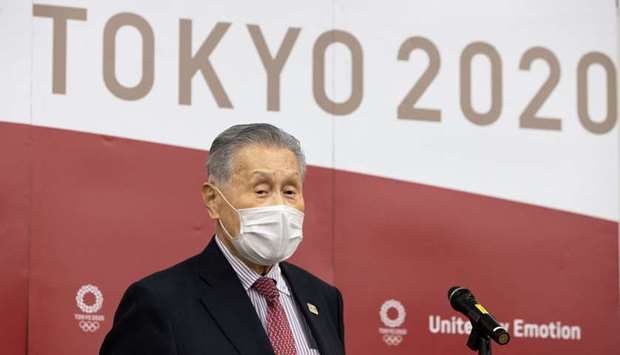The president of the Tokyo 2020 Olympics organising committee, Yoshiro Mori, will resign over a remark that sparked an outcry, two sources said on Thursday, while the former prime minister said he could not let the controversy drag on.
Mori's resignation would be bound to raise new doubts over the viability of holding the postponed Games this year.
The sources, who have knowledge of the matter, said Mori would be replaced by former Japan Football Association president and mayor of the Olympic village, Saburo Kawabuchi, 84.
Mori made the remark - that women talk too much - at a Japanese Olympic Committee board meeting early this month, setting off a storm of criticism at home and abroad.
Mori, 83, told Nippon TV he would ‘explain his thoughts’ at a meeting on Friday but he had to deal with the issue. He did not confirm the reports that he would step down.
‘I cannot let this problem prolong any longer,’ Mori said, and he again apologised for the remark.
A spokesman for the organising committee declined to comment.
Mori first retracted the comment about women at a hastily called news conference on Feb. 4, acknowledging it was inappropriate and against the Olympic spirit.
But he declined, at that time, to resign.
Pressed then on whether he really thought women talked too much, Mori said: ‘I don't listen to women that much lately, so I don't know’.
Mori served as prime minister for a gaffe-plagued year from April 2000.
His comment on women drew sharp criticism in parliament, where opposition lawmakers demanded his resignation, and from the public on social media.
Olympic and ruling party officials told Reuters this week that Mori's resignation could imperil the Games.
They said his deep network of politicians and Olympic officials was key to pulling off a successful Games.
But others were in favour of his resignation.
‘Because of Mori's comments, I've recognised again the importance of gender equality and diversity,’ ruling party lawmaker Masazumi Gatona said on Twitter.
‘Discrimination is absolutely unacceptable.’
Mizuho Fukushima, head of the opposition Social Democratic Party, said on Twitter: ‘This is the result of many, many women raising their voices. Of course, this doesn't resolve the problem. We need to create a society of gender equality.’
VACCINATION DRIVE
The 2020 Tokyo Games were postponed for a year because of the novel coronavirus and the pandemic is still creating huge questions about their viability, even though the government has said it is determined the July 23-Aug 8 Games go ahead.
Even before last year's postponement, ballooning costs and a plagiarism scandal involving the official logo bedevilled preparations.
But the coronavirus has proven to be the biggest threat.
Nearly 80% of the public are opposed to holding the Games this year because of concern about the coronavirus, recent polls show.
Prime Minister Yoshihide Suga has said coronavirus vaccines are key to a safe Olympics and he said on Wednesday the vaccination drive would begin in the middle of next week.
Japan's vaccination campaign is later than in most major economies and any delay could sow doubts about a government aim to secure enough doses for everyone before the Olympics.
If Mori does step down, it would the first time an Olympics organising committee president has not seen the job through to a Summer Games since the 2004 Athens Olympics.
Gianna Angelopoulos-Daskalaki led the successful Athens bid but was pushed aside by the government, which appointed Panagiotis Thomopoulos organising committee president. Angelopoulos-Daskalaki replaced Thomopoulos after the International Olympic Committee warned Greece they could lose the Games because of poor progress with preparations.
Angelopoulos-Daskalaki was the first woman to run an organising committee for an Olympics.

